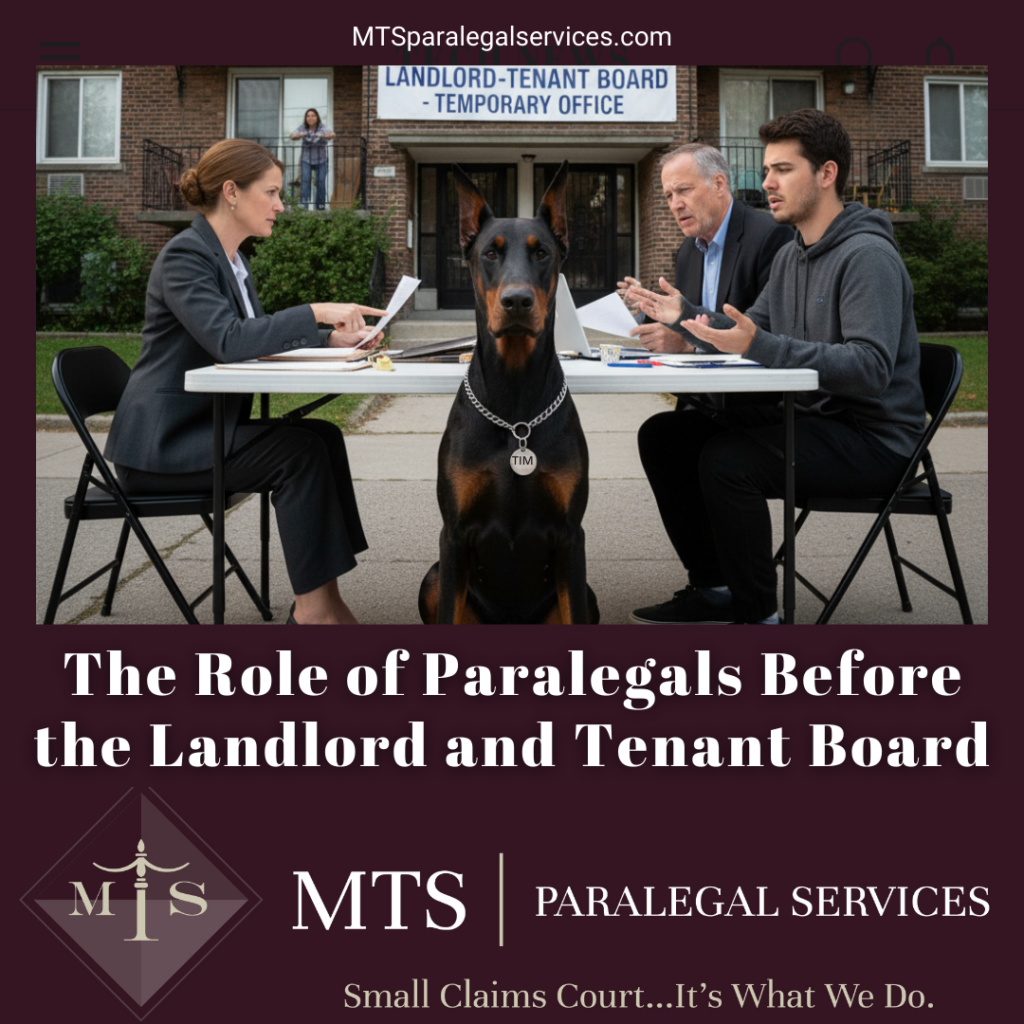
The Role of Paralegals Before the Landlord and Tenant Board
Preparing Evidence for Ontario Small Claims Court: Best Practices
Litigating in Ontario’s Small Claims Court requires not only an understanding of the procedural framework but also a strategic approach to presenting evidence. The admissibility, reliability, and clarity of evidence can determine the strength of a case. Parties who prepare their evidentiary materials with precision improve their prospects of persuading the presiding Deputy Judge. MTS Paralegal Services, a professional paralegal firm in Ontario, assists clients in navigating this process to ensure their claims are supported with robust, well-organised documentation.
Understanding the Role of Evidence
Evidence forms the foundation upon which all legal arguments are evaluated. In Small Claims Court, the Rules of the Small Claims Court under the Courts of Justice Act govern the procedural framework. Evidence may take the form of documents, witness testimony, photographs, contracts, receipts, text messages, emails, or expert reports. The probative value of evidence lies in its relevance to the dispute and its ability to establish key facts.
The court’s focus is not on complex legal doctrines but on fairness, efficiency, and truth-seeking. Evidence that is poorly organised or unsupported by context diminishes its value and can hinder a party’s credibility. For this reason, preparing evidence with professional guidance, such as that offered by Tim at MTS Paralegal Services, is vital.
Documentary Evidence
Documentary evidence is often the most persuasive in Small Claims Court. Parties should compile contracts, invoices, account statements, or correspondence that substantiate their claim or defence. Documents must be legible, complete, and organised chronologically. Partial or unclear documents may invite judicial scepticism or objections from opposing parties.
It is prudent to prepare a list of documents, often referred to as a document brief, which indexes each item with clear labels. This brief should be disclosed to the opposing party in advance, as required under Rule 18 of the Small Claims Court Rules, to avoid inadmissibility or procedural objections. Tim at MTS Paralegal Services frequently assists litigants in structuring documentary briefs that comply with these requirements.
Witness Testimony
Witness testimony remains a central form of evidence. Witnesses provide first-hand accounts of facts in dispute, and their credibility is often decisive. A party should ensure witnesses are reliable, impartial, and well-prepared to answer questions. Witnesses may be cross-examined, so consistency and accuracy are critical.
In some cases, expert witnesses are required, such as contractors providing assessments of damages or valuators appraising property. Expert reports must comply with court rules and should be submitted in advance. Tim at MTS Paralegal Services advises litigants on whether expert evidence strengthens their case and how to present such testimony effectively.
Photographs and Visual Evidence
Visual evidence, such as photographs, videos, or diagrams, can assist the court in understanding factual issues. These materials must be authenticated by a witness who can confirm when, where, and by whom they were created. Without such foundation, visual evidence may be challenged for lack of reliability.
Photographic evidence should be dated and labelled clearly, with contextual explanations attached. For example, in property damage claims, photographs taken at the time of the incident hold greater weight than those captured long after.
Digital Evidence
The prevalence of electronic communication has expanded the scope of evidence in Small Claims Court. Text messages, emails, and digital records are admissible if authenticated and relevant. Parties should ensure such evidence is complete, not selectively excerpted, and preferably supported by metadata.
Digital evidence requires careful presentation. Screenshots alone may be insufficient without testimony verifying their accuracy. Tim at MTS Paralegal Services has experience preparing digital records in a format that meets the court’s expectations.
Organising and Presenting Evidence
Effective advocacy in Small Claims Court involves presenting evidence in a logical, concise, and coherent manner. Parties should:
- Create an evidence binder or electronic file indexed with tabs.
- Number pages sequentially for easy reference by the judge.
- Prepare a summary of evidence highlighting the relevance of each item.
- Anticipate challenges from the opposing party and prepare responses.
During trial, litigants should avoid overwhelming the court with excessive or irrelevant material. The Deputy Judge values precision, not volume.
Procedural Compliance
Failure to comply with evidentiary disclosure rules can undermine a claim. Parties must respect timelines for serving and filing evidence. Late disclosure may result in exclusion unless the court grants leave. Procedural compliance demonstrates respect for the court and enhances credibility.
Tim at MTS Paralegal Services emphasises that evidence is not merely collected but strategically deployed within the framework of Ontario’s rules. Proper preparation ensures the party’s narrative is supported at each stage of the hearing.
Professional Assistance from MTS Paralegal Services
Litigants who attempt to prepare evidence without guidance often face procedural pitfalls and weakened cases. By retaining professional assistance, claimants and defendants benefit from strategic advice, meticulous organisation, and legal advocacy.
Tim at MTS Paralegal Services, based in Kitchener, provides tailored support in preparing evidence for Ontario Small Claims Court. From organising documentary briefs to advising on witness testimony and digital records, Tim ensures litigants are equipped to present their strongest case. For more information or assistance, contact MTS Paralegal Services at https://mtsparalegalservices.com/.
This content does not constitute legal advice. For up-to-date guidance or legal advice specific to your situation, please contact MTS Paralegal Services Professional Corporation or call (226) 444-4882.
